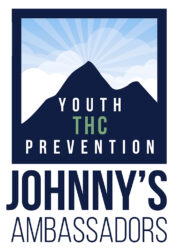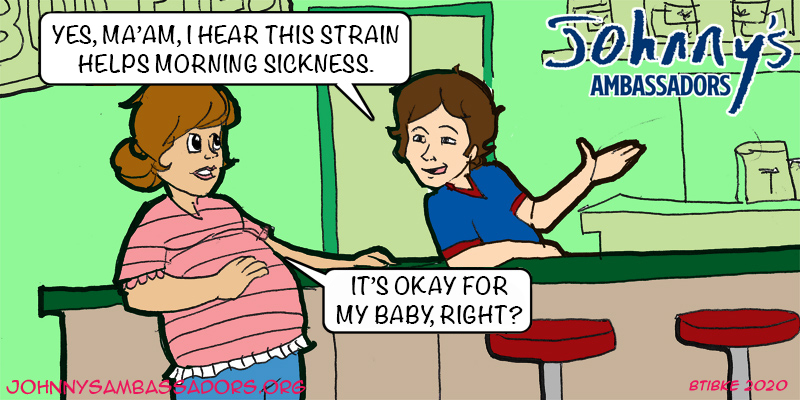By Laura Stack
One of the least publicized but arguably most damaging cannabis-induced physical disorders, as defined by the Diagnostics and Statistics Manual of Mental Disorders, Fifth Edition (a.k.a. DSM-5), is pregnancy complications. Unfortunately, many expectant mothers are either deliberately misled or simply ignorant about how marijuana can harm their developing babies. The false narrative may cause them to seek out marijuana from dispensaries in states where marijuana is legal.
Most dispensaries are fine with this. In a 2018 study in Colorado, researchers contacted 400 dispensaries by phone, with the caller claiming to be eight weeks pregnant and asking if marijuana was safe to use to ease her morning sickness. Thirty-seven percent of the contacted dispensaries were licensed only for medical sales, 28% for recreational sales, and the remainder for both. A shocking 69% percent recommended marijuana as completely safe for morning sickness in the first trimester, with 35% of those claiming it was safe to use any time during pregnancy.
In 2016, Kaiser Permanente tested 318,085 pregnant women for drug use in locations across the United States. About 20% of all expectant mothers 24 years old and younger tested positive for marijuana—about twice the self-reported value. Women 25-34 averaged about 5.1%, while older women averaged 3.3%. All these figures are up from their 2009 values, indicating the negative effect that legalization and poor medical advice has had on the populace.
Children First
But this article isn’t as much about the mothers per se; they have the legal right, if they’re over the age of 21, to use THC products weed in those states where it’s legal for recreational or medical purposes. The real problem is the THC can be toxic to unborn children. Marijuana contains over 500 chemicals, including carbon monoxide and some carcinogens in stronger concentrations than in cigarette smoke. Some, including THC, can pass through the placental membrane from mother to child and affect a fetus’s brain.
In some states, marijuana packaging includes the risk to pregnant mothers. However, the labeling isn’t yet as blunt as it is with cigarette packaging, and it’s moot if they acquire their marijuana from the black market or grow it themselves.
Marijuana and Fetuses
At this point, no amount of marijuana has been proven safe for use during pregnancy. When the American Academy of Pediatrics issued its first official guidelines on the subject in 2018, they recommended pediatricians urge their pregnant patients to avoid marijuana completely during pregnancy or breastfeeding and inform them about the lack of any safety data regarding marijuana. Such counseling, they noted, should begin in adolescence for girls who expect to be mothers someday. As they also point out, “Legalization of marijuana may give the false impression that marijuana is safe.” This may explain why so many expectant mothers have recently been using marijuana to attempt to treat morning sickness.
The guidelines article goes on to cite literally dozens of studies showing significant harm to fetuses exposed to marijuana in the womb. One of the many compounds in marijuana, cannabidiol, seems to increase the permeability of the placental membrane, while THC disrupts cortical development in embryos, and marijuana use may reduce placental blood flow, harming the fetus in numerous ways. In rat studies, fetuses had concentrations of THC in their blood plasma equal to one-tenth to one-third of the mother’s THC levels. Furthermore, smoking marijuana produces five times as much carbon monoxide as smoking tobacco; this may harm a fetus’s lung development and brain development due to lack of oxygen. Additionally, the chemicals in marijuana may inhibit folic acid uptake, interfere with cellular growth, and damage neural development in fetuses. Marijuana exposure seems to shorten a child’s gestational period. These are just a few of the many, many ways marijuana might be harmful to fetuses.
Analyzing the Effects
The science of exactly how marijuana affects developing fetuses is still in its infancy, to coin a phrase, but most health professionals take a cautious approach to its use during pregnancy, given all the possible harms to the child. One study reports that immediately after birth, babies exposed to marijuana during gestation were more likely to have tremors until 2-4 days old, as well as a heightened startle reflex. These issues went away within 30 days.
Meanwhile, the Adolescent Brain and Cognitive Development (ABCD) study was conducted in 2016-2018, studying 11,875 children ages 9-11. According to results published in the Journal of the American Medical Association Psychiatry in September 2020, 665 of the children had suffered prenatal exposure to marijuana. The researchers determined that the exposed children were more likely to suffer later mental illness, including psychotic-like experiences, as well as attention, thought, and social problems, than children who were not exposed to marijuana in utero. The study also found that exposed children averaged lower birth weight, less cranial capacity, and less white matter in their brains that other children. Their recommendation was to discourage all cannabis use in pregnant women.
Similarly, a metanalysis of 24 studies noted decreased birth weight for exposed babies (about 110 grams on average), as well as a 2.02-time greater likelihood of the newborn being admitted to a Neonatal ICU unit. In addition, two long-term studies, the Ottawa Prenatal Prospective Study (OPPS) and the Maternal Health Practices and Child Development Study (MHCPD) demonstrated poor outcomes. Both studies have been observing their study cohorts for decades (since 1978 for OPPS). They have observed a wide range of negative effects in children exposed to marijuana during development, just a few of which include impaired cognition at nine months, impairments in executive functioning like verbal reasoning and memory tasks at later ages, as well as increased ADHD-like behavior, greater difficulty at problem solving and applying analytical skills, and increased behavioral problems and delinquency as opposed to unexposed individuals. The studies’ authors suggested the children’s overall intelligence wasn’t significantly affected by prenatal exposure to marijuana; most, if not all, of the deficit seemed to be related to executive functioning, the self-regulation process we used to plan, understand instructions, visualize, set goals, and multitask.
Don’t Expose Your Unborn Child to THC!
Given the lack of knowledge of many pregnant women about the dangers of marijuana for their developing babies, in conjunction with the bad advice received from marijuana dispensaries and advocates, I fear that we’re setting ourselves up for an entire generation of damaged children, with all the social costs and familial pain it brings. We must continue to press for marijuana regulation that limits the drug’s access to underage women, for required legal warnings from dispensaries, better training given to dispensary budtenders, for better labeling on legal products and medical marijuana, and for better counseling of pregnant women of all social levels. And Johnny’s Ambassadors will continue to educate anyone we come across and have the ability to influence in our social networks.


